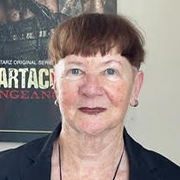
Chloe Smith
A chance meeting with producer Larry Parr in a bar in 1983 kickstarted Chloe Smith’s long career in the New Zealand film industry. During that time she has progressed through the ranks to become one of the country’s most experienced producers.
Smith had just completed a stint working in arts administration with Limbs Dance Company and Auckland’s Mercury Theatre, and was between jobs.
Parr needed a production secretary for a movie based on Ronald Hugh Morrieson's novel Pallet on the Floor, which was about to start shooting in Whanganui. Smith packed her bags and found herself working long nights in the production office, typing up and copying call sheets. Three feature films later (including Came a Hot Friday and Shaker Run), she was elevated to the role of production manager.
Smith was born in the United Kingdom, and her family tried several international locations before eventually settling in Wellington when she was 12. Smith was always an avid reader. While she was attracted to a creative life, her parents persuaded her to play it safe, and she studied science at Otago and Massey universities.
Ultimately, she came to believe that her microbiology training was very useful for a screen career: "Science allows you to understand systems and of course a lot of production is just simply getting the systems right."
After production managing a number of features (including Queen City Rocker in 1986 and Crush in 1992), Smith actively lobbied for a job for the first time: Jane Campion’s The Piano. Smith recalls seeing Campion on the bus in Wellington, when they travelled to their respective schools as children. "She always just exuded this incredible confidence and presence." When Smith got the call about production managing The Piano, at first she "freaked out", then regained her equilibrium by telling herself that the extra scale of the production "just meant more rental cars".
The international success of The Piano — including winning the top prize at the Cannes Film Festival and three Oscars — brought New Zealand to the attention of international producers. In 1994, Americans Rob Tapert and Sam Raimi chose New Zealand as the location for their TV movies reimagining the world of legendary Greek hero Hercules. They were a hit with audiences around the world, and Tapert — through his production company Pacific Renaissance — would go on to extend the Hercules franchise through serial television (Hercules: The Legendary Journeys) and spinoffs (Xena: Warrior Princess and Young Hercules).
Throughout that period of explosive growth, Smith acted as production manager and line producer, eventually receiving (or rather taking) a producer credit on Xena.
"I reinvented myself as the New Zealand producer", she says. "I was running two main units (Hercules and Xena) and two second units at the same time — it was a really big workload. There was an American line producer. So I just announced one day that I should be called the New Zealand producer, and everybody went, 'oh yeah, that’s a good idea'. So, you know, seize the day!"
Smith believes that titles or credits are less important than the job description (and the work that you are seen to be doing), but since Xena, producer is the title she has normally had. Smith is not a financial producer, raising funds or seeking investment, and she’s at pains to point out that she’s not a creative producer either: "I've never gone, I'm going to option this book and make a film out of it." Often she will help out on the details and expenses of shooting in New Zealand, and then manage the shoot.
Smith continued to work on Rob Tapert productions through the 2000s, including shows Legend of the Seeker (2008-2010), Ash vs Evil Dead (2015) and— most notably in terms of scale, the Spartacus: Gods of the Arena franchise (2010-2013). She describes Spartacus as "an extreme version of Upstairs Downstairs".
In 2006 Smith joined John Barnett to co-produce hit comedy Sione’s Wedding, working across many locations on a tight budget. In 2018 she co-produced telefeature In Dark Places, on which she shared a NZ Television Award for Best Feature Drama.
Since then, much of her work has been in the South Island. Australian series Wanted was filmed partly around Queenstown, while Netflix romance The Royal Treatment and Blumhouse horror movie Black Christmas both shot in Dunedin. She also reunited with Jane Campion in the Maniototo for Oscar-winner The Power of the Dog (which Smith co-produced). TV drama Dark City: The Cleaner (which saw her reuniting with Sione's Wedding producer John Barnett) was filmed in Christchurch in 2023.
At the time of writing, Smith was in pre-production for a further season of Spartacus. She jokes that this will have to be her last job. "I'm working with people now that I remember when they were babies — bizarre."
Profile written by Dan Slevin; published on 29 February 2024
Sources include
Chloe Smith
Bret Ryan Rudnick, 'An Interview with Chloe Smith' Whoosh website. Loaded 2001. Accessed 29 February 2024
Sione's Wedding press kit